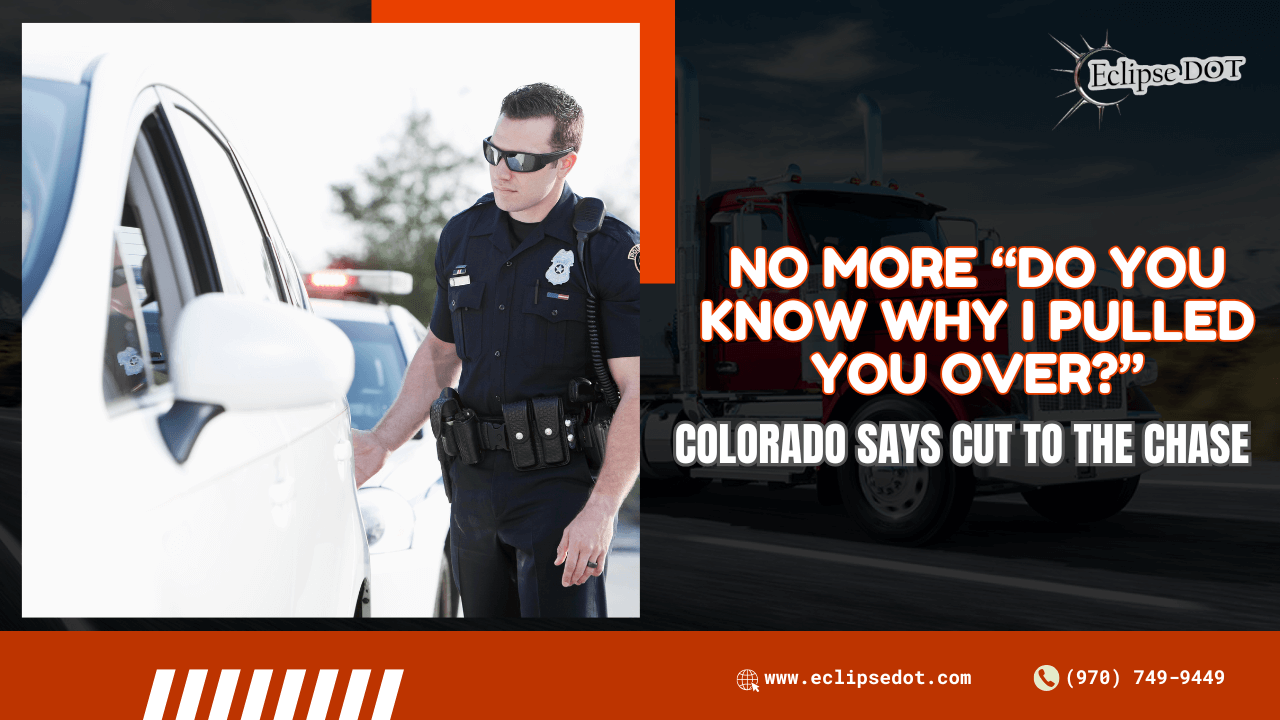If you’ve ever been pulled over, you know the drill. You see the flashing lights, your stomach drops, and suddenly you start running a full mental audit of every questionable driving decision you’ve made in the last five minutes. Was I speeding? Did I forget my blinker? Is my taillight out? Or is this about that U-turn I definitely shouldn’t have made three blocks back?
And then comes the moment of truth—the officer strolls up to your window and hits you with the dreaded question:
“Do you know why I pulled you over?”
Well, if a new Colorado bill passes, that question might be gone for good.
A fresh piece of legislation, HB25-1243, is looking to ban officers from asking drivers if they know why they’ve been stopped and instead require them to immediately state the reason.
No more guessing games. No more awkward silences while you pretend to be confused. Just straight-up business.
The bill, introduced by Rep. Mandy Lindsay and Sen. Faith Winter, is set for review by the Colorado House Judiciary Committee on March 12. And while it’s sparking plenty of debate, one thing is for sure: If this bill passes, traffic stops in Colorado are about to get a whole lot more direct.
What’s in the Bill?
Let’s get one thing straight—this bill isn’t handing out get-out-of-jail-free cards.
If an officer forgets and asks the question anyway, it won’t invalidate your ticket. It won’t dismiss any charges. And it definitely won’t make that speeding fine disappear just because the officer didn’t follow the script.
In other words: Don’t get any funny ideas.
What the bill does say is that officers must immediately inform drivers why they were pulled over—unless special circumstances make that unreasonable (which is lawyer-speak for “unless there’s a really good reason not to”).
It’s all about cutting down on confusion, improving transparency, and—let’s be honest—probably speeding up the process so nobody has to spend extra time parked on the shoulder while traffic flies by at 80 mph.
Which brings us to the big debate—who’s for it, and who’s against it?
Law Enforcement Isn’t Thrilled… But AAA Loves It
No surprise here—law enforcement agencies aren’t exactly celebrating this bill.
Many officers already inform drivers why they’re being pulled over as part of standard procedure, so some are questioning why this bill is necessary in the first place. Others worry it might add unnecessary complications to an already high-stakes interaction.
After all, traffic stops aren’t just about handing out tickets—they’re also unpredictable situations where officers don’t always know what they’re walking into. Some argue that having a bit of flexibility in how they engage with drivers is important for safety reasons.
But then there’s AAA—and they’re all in on this one.
If you didn’t already know, AAA has been knee-deep in traffic safety since basically the beginning of time. (Okay, maybe not that long, but pretty close.) These are the folks who got roads paved, numbered highways, and even invented the stop sign. Yeah. That’s their resume.
So when AAA’s regional director of public affairs, Skyler McKinley, stepped in to comment on the bill, he had a lot to say.
“This bill fosters trust, clarity, and mutual respect between law enforcement and members of their communities in those moments they’re most likely to interact,” McKinley explained.
But that wasn’t all. He also pointed out one of the most important safety benefits of this bill:
“What’s more, it reduces the time that both drivers and law officers spend at the roadside with traffic whipping by. That protects everybody, from drivers to passengers to law enforcement – and beyond.”
And you know what? That’s a fair point.
Standing on the side of the highway while cars fly by just inches away? Not exactly a safe place to be. The faster an officer can issue a citation (or a warning) and send everyone on their way, the better.
What This Means for Drivers
If HB25-1243 becomes law, traffic stops in Colorado are going to get a whole lot more cut and dry.
No more awkward guessing when an officer pulls you over. No more stalling for time while you try to figure out if they noticed that rolling stop back there. Just straight-up facts.
Some drivers might love this change. Others might hate it. But one thing’s for sure—if you were banking on playing dumb when an officer asks you why you were stopped, that strategy is about to be obsolete.
Will This Actually Change Anything?
Maybe. Maybe not.
On the one hand, some states—including California, Connecticut, and Minnesota—have already adopted similar laws in the past few years, and the response has been mostly positive.
On the other hand, plenty of officers already get straight to the point when they pull someone over, so this might not actually change much in practice.
But for drivers who panic every time they see flashing lights in their mirror—at least you’ll know right away whether it’s for speeding, a busted taillight, or that totally illegal U-turn you thought nobody saw.
Final Thoughts
So, what’s the takeaway here?
If this bill passes, Colorado drivers will no longer have to guess why they’re getting pulled over. Officers will be required to tell them upfront, cutting down on unnecessary back-and-forth and (hopefully) speeding up the process.
Will this make traffic stops smoother, safer, and more efficient? Maybe.
Will it stop you from getting a ticket if you were clearly speeding? Absolutely not.
So, if you’re out there pushing the limits of the law on Colorado’s roads, just know this:
The officer isn’t going to ask you why you think you got pulled over. They’re just going to tell you.
And then, most likely, hand you a ticket.
Safe driving, everyone.
Gain exclusive access to our CDL & DOT Compliance articles with a trial at DOTDocs.com. And don’t forget to claim your FREE micro audit at THE ECLIPSE DOT MICRO AUDIT. Ready for seamless operations? Discover the difference today!
Sources:
Colorado General Assembly – HB25-1243 Bill Summary
LegiScan – Colorado HB25-1243
KOAA News – Colorado Bill Would Prohibit Officers From Asking ‘Do You Know Why I Pulled You Over?’
Colorado Legislative Documents – HB25-1243 Full Text


